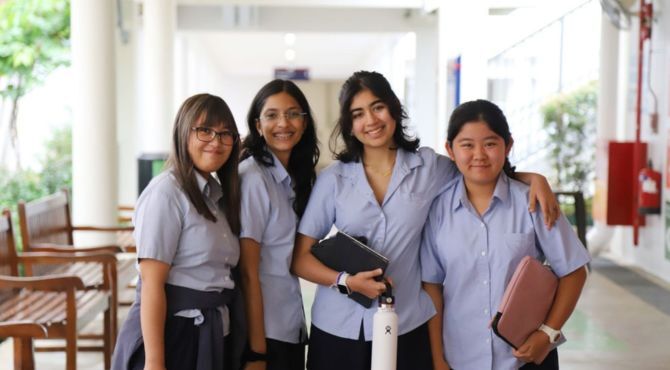10 lessons from the experts
Finding the right school is one of the most stressful parts of an international move. Here, education experts share their 10 most valuable lessons.

Tanglin Trust School
Read related articles from Relocate Global
- Get set for summer
- What to look for in a summer school: five questions for parents and guardians
- A class act: education of the future
- AI in education
- Which post-16 qualification?
5. Don’t stress about entrance tests: To help your child prepare for school entrance exams engage with the admissions team to understand their assessment criteria, advises Marina Anpilogova at XCL World Academy: “It is equally important to provide holistic support to your child, both academically and emotionally, to help them build confidence, manage stress and approach the exam positively.”“Entrance exams are baseline tests, and the focus is on numeracy and literacy,” says Epsom College Malaysia’s Kate Carden-Brown. “It is not possible to cram for such a test, but students should get into the habit of reading daily to develop their vocabulary.” At Schule Schloss Salem the entrance exams are designed to take snapshot of the child’s academic levels: “we offer support for an academic preparation accordingly before school starts in September,” says Dr Stephanie Nau.6. Don't overlook the holistic development of your child. "Academic excellence should be non-negotiable but look for the myriad of additional offerings that nurture a student,” says Mel Curtis, head of the International School of Nice in France. “This includes arts to athletics and community service to cultural diversity and mental well-being.”7. Engage the child in researching the new destination: “Involve children in the school selection process and make a pre-move visit, if possible,” says Marina Anpilogova at XCL World Academy. “Maintaining a positive outlook and nurturing the child’s sense of identity are key strategies to facilitate a smooth transition and foster a sense of belonging in the new environment.” International schools, including Schule Schloss Salem often run summer programmes which can be a great way of introducing a destination. “Our two-week summer experience shows what boarding school life at Salem is like,” says head of admissions Dr Stephanie Nau.8. Don’t worry about relocating in the middle of a school year: Many international schools offer rolling admissions, which means that if seats are available in your child's grade, they can join at any time during the academic year. “This flexible enrolment system ensures a smoother transition for your child and allows them to continue their education without disruption,” says XCL World Academy’s Marina Anpilogova.9. Understand the emotional impact of relocating on children: Ensure that there is human contact early in the admissions process says Chris Seal of Tanglin Trust School in Singapore. “Ask if there are buddy systems and follow-ups in place to ensure that the settling process is given the best possible chance of success. This is a labour-intensive part of the role of any good school and something we focus on a great deal at Tanglin.” International schools often provide emotional support services to help students adjust to their new environment. This may include a buddy system, counselling services, and orientation programmes to ease the transition. “At XCL World Academy we prioritise emotional well-being alongside academic success and create a supportive and nurturing environment for all students,” says Marina Anpilogova.10. Be flexible on curriculum: “At Tanglin we are unique in Singapore in offering both A Levels and the International Baccalaureate Diploma (IBDP),” says Chris Seal, head of Tanglin Senior School. “Our experience of working closely with universities across the world is that they understand both and can assess students for courses irrespective of the curriculum followed.”
Read the latest issue of Think Global People magazine. Read your copy here.

Find out more about the Think Global People and Think Women community and events.

Subscribe to Relocate Extra, our monthly newsletter, to get all the latest international assignments and global mobility news.Relocate’s new Global Mobility Toolkit provides free information, practical advice and support for HR, global mobility managers and global teams operating overseas.
©2024 Re:locate magazine, published by Profile Locations, Spray Hill, Hastings Road, Lamberhurst, Kent TN3 8JB. All rights reserved. This publication (or any part thereof) may not be reproduced in any form without the prior written permission of Profile Locations. Profile Locations accepts no liability for the accuracy of the contents or any opinions expressed herein.



























